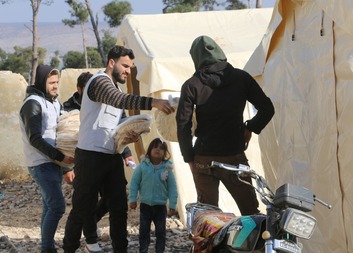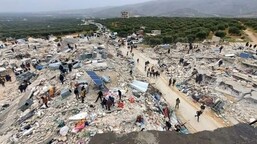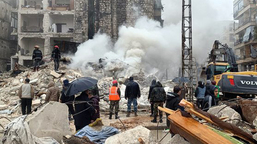More than a month has passed since the devastating earthquake that struck Turkey and Syria. The tremors have killed tens of thousands of people and left millions more without a roof over their heads. Caritas Czech Republic has been helping through its partners on the ground since day one. Help is still very much required.
DONATE TO CARITAS FOR TURKEY AND SYRIA
1. What is the current situation in the affected areas?
The devastating earthquake of 7.8 magnitude on the Richter scale hit an area of 110,000 square kilometres, almost a third larger than the Czech Republic. More than 200,000 buildings were destroyed. The disaster occurred in the early hours of the morning when people were asleep, which caused tragic consequences. In addition, many buildings in southern Turkey and Syria did not meet seismic standards and many older buildings in particular could not withstand the strong tremors. According to the World Health Organisation, up to 26 million people in both Turkey and Syria may be affected by the disaster.
Attention is now focused on providing humanitarian assistance to survivors who have lost their homes, loved ones and often their livelihoods.
2. What is most needed at the moment?
There is and will continue to be an urgent need for humanitarian assistance. Hundreds of thousands of people remain in the affected area with nowhere to go. Many people on the ground are still waiting for the bodies of their loved ones to be recovered. People are sleeping in tents, cars or outside by the fire. Freezing temperatures are worsening the already desperate situation in the devastated regions. People need both food aid and adequate shelter and warm clothing. Although this aid is reaching most places, it is important that it does not stop.
It is particularly urgent to ensure adequate sanitation to prevent the spread of disease and epidemics. There is still a lack of sanitation facilities, toilets, showers and ordinary soaps at the disaster site. In addition, in recent months there has been an outbreak of cholera in Syria, which is one of the few diseases that can be transmitted from dead bodies. Ensuring proper sanitation is therefore absolutely essential.
3. How is Caritas Czech Republic helping thanks to the fundraising appeal Caritas for Turkey and Syria?
Our colleagues from partner organisations have been working directly in the affected areas in Turkey and Syria since day one. Together, we are providing the basic necessities to the people affected by the earthquake:
- We are distributing food parcels that are enough to feed a family of five to six for one month. We also distribute drinking water.
- We are providing temporary shelter - setting up tents, distributing mattresses, blankets and heating to keep the tents warm.
- Our colleagues are also installing containers on site to provide clean and comfortable shelter for the affected people. Inside the containers there are portable toilets and showers to ensure sanitation.
- We provide hygiene kits that contain basic necessities such as toothbrushes, toothpaste, wet wipes, soaps, sanitary pads or disinfectants.
- We build emergency latrines with water storage facilities.
- We distribute winter clothes.
- Our colleagues are also providing on-site psychological assistance to people affected by the earthquake.
We are providing humanitarian aid in the Turkish province of Hatay and in the Syrian regions of Aleppo and Idlib.
4. How do we manage to get aid into areas controlled by rebel groups in Syria?
The north-western part of Syria, one of the areas most affected by the earthquake, is under the control of several opposition armed groups. It has therefore been very difficult from the start to send humanitarian aid to this area, which only reached the site for the first time on the fourth day after the earthquake. This is for several reasons - there is only one official crossing from Turkey, Bab al-Hawa, into the north-western province of Idlib. In addition, according to the UN, the roads leading to the Bab al-Hawa crossing were severely damaged, making it impossible to get humanitarian aid into Syria quickly. In this area, however, there are about 4 million people who were already dependent on humanitarian aid before the earthquake.
"People in north-western Syria had to rely on what they had available for relief after the earthquake, which was not much. However, both our partner organisations started providing aid to the affected people on the ground almost immediately," says Anna Volfová, Caritas Czech Republic's aid coordinator for Turkey and Syria.
It was the long-term partnership with established organisations in Syria that allowed us to start helping immediately and to use the donations from the Caritas for Turkey and Syria collection effectively.
A week after the earthquake, the announcement of the opening of two more border crossings, Bab al-Salam and al-Rai, came. But in the first 72 hours, which are critical for saving lives in disasters, only aid from locally based organisations like our partners reached north-west Syria.
5. How will our aid continue?
We are continuing to provide humanitarian assistance to people affected by the earthquake. We will continue to distribute food and hygiene packages on the ground, provide shelter and warm clothing, as well as vital psychological support.
People affected by the earthquake will also need long-term assistance as soon as possible. It is important to provide them with more permanent shelter as soon as possible. Our colleagues on the ground are identifying places where such shelters could be established. The affected people will also need support in the form of cash assistance, for example the distribution of vouchers for the purchase of food and material aid.
6. How can you help people affected by the earthquakes in Turkey and Syria?
At the moment, the most effective way to help is to send a financial donation. With your donations, we can purchase the most acute needs on the spot to distribute to the people affected by the earthquake. Help is still very much needed. The catastrophic earthquake affected 26 million people who will need our help in the months and years to come. Please join us in helping and donate to the Caritas for Turkey and Syria. Thank you to everyone who decides to help.














